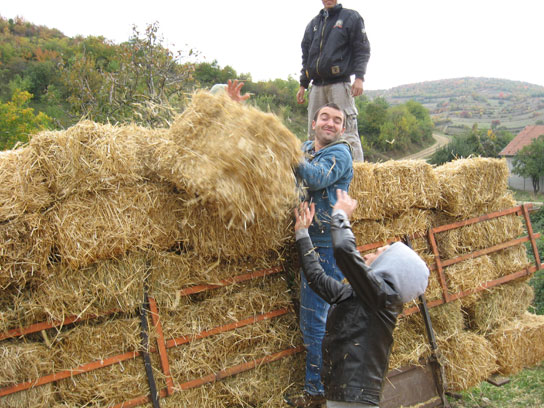
Paradise Stacion
Fatmir Mustafa - Carlo
Curated by Ramiro Camelo
Opening: 06 October 2008, 18:00
06 October 2008 - 20 October 2008
Unbelievable! Fatmir Mustafa - Carlo and Ramiro Camelo (in live Streaming form London)
22 October 2008, 14:00
Venue: Brussels Biennial 2008, L'appartement 22 Program on BB1 in Brussels.
Curator's notes
'All really inhabited space bears the essence of the notion of home'
Gaston Bachelard, 'The poetics of space'
Although Museums and art galleries are necessarily inhabited spaces with visitors wandering through its exhibits by day they are also spaces of solitude once the doors are closed.
Any attempt to recreate an art space as a space of interiority or dwelling will be inevitably limited if it is done literally. In some cases the idea of a living place/space in an art gallery or museum can be utilized as a 'strategic concept' as a tool in order to bring out a particular evocation or force-, this is the case with the project 'Paradise station' by Carlo.
With 'Paradise stacion' the artist proposes to make a charged but discrete site-specific installation, fully taking over the gallery's interior. The proposal is to fill up the exhibition space, top to bottom, with bales of straw leaving only a reduced corridor for circulation, endeavouring to make this simple space unfamiliar, dark and oppressive spatially and-psychologically charged in order to explore the challenging relationship between space and memory.
There are two clearly defined poles co-existing within this work the first being the physical effect created by the fullness of the space and the reassuring familiarity that the bales of straw produce and its dual opposite the sensation of something imposing oppressive, (the tension and difficulty felt from the displacement inside the installation).
This whole installation could operate in the space between the concepts of an architectural enclosurement produced though its concrete material means, juxtaposed against a more fluid notion, that of spatial boundaries experienced through the senses.
For the artist this installation exists as 'an exercise of memory', a way of inhabiting a space of childhood nostalgia. In fact, the site: the Stacion building recalls to him the ancestral barn from his childhood. This evocation initiates a process where the artist tries to produce a 'topography of memory', not a memory that exclusively personal, but something more generic. He appeals to a common memory a more collective and historic experience that is unreservedly worthy to keep alive. Here the concept, of 'topography' refers to Bachelard's study of topoanalysis, of the 'space we love'.
'I should like to give the name topoanalysis to this auxiliary of psychoanalysis. Topoanalysis, then, would be the systematic psychological study of the sites of our intimate lives. In the theatre of the past that is constituted by memory, the stage setting maintains the characters in their dominant roles. At times we think we know ourselves in time, when all we know is a sequence of fixations in the spaces of the being's stability 'a being who does not want to melt away, and who, even in the past, when he sets out in search of things past, wants time to 'suspend' its flight. In its countless alveoli space contains compressed time. That is what space is for.' (Gaston Bachelard 'The Poetics of Space'p.8)
A central idea in Bachelard work is that the self is ready to be discovered through an investigation of place. He suggests that we cannot relive duration, but we can return to places where memories have become fixed. (Ibid. 9.) Additionally, Bachelard touches on the hermeneutics of place and in Paradise Stacion, Carlo also promotes a type of mental archaeology, the basic material, straw is full of significance and penetrated with varied references but he emphasizes a personal one that has its own private resonance and exploits it to the full. This switches his vivid experience into a specific and more mundane material, straw, loosely referring to the social sculpture Beuys ideal, 'how we mould and shape the world in which we live'.
Ultimately, the artist remains faithful to his original idea for the installation it remains rigid and restricted in spite of its personal and intimate motivation. As everyone will find his or her own way through the work, it could be characterized in terms of the Umberto Eco concept of an open work, in the way 'the artist's decision to leave some constituents of the piece to the public or to chance'. This openness permits chance uncertainty and entropy throughout its making and throughout the time of it's viewing.
Ramiro Camelo
Fatmir Mustafa - Carlo: Paradise Stacion is part of the program of Stacion - Center for Contemporary Art Prishtina for "LE MONDE AUTOUR DE VOUS" by Abdellah Karroum (L'appartement 22, Rabat) in collaboration with Albert Heta, Vala Osmani (Stacion - CCA Prishtina, Prishtina) and Anne Szefer Karlsen (HKS, Bergen) produced for Brussels Biennial 2008. The program of Stacion Center for Contemporary Art Prishtina for "LE MONDE AUTOUR DE VOUS" and Brussels Biennial 2008 is a curatorial work of Albert Heta and Vala Osmani.
The participation of Stacion - Center for Contemporary Art Prishtina at Brussels Biennial 2008 is kindly supported by Ministry of Culture, Youth and Sport of Republic of Kosova and DZG.